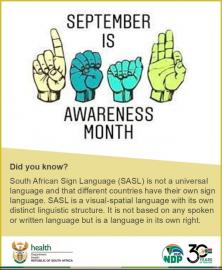
By Morapedi Sibeko
This September, as we commemorate Deaf Awareness Month, it is a good moment to look back on the progress made in recognising South African Sign Language (SASL) and to raise awareness of the experiences of Deaf people, whose voices emphasise the continued need for inclusion and activism.
The South African National Deaf Association (SANDA) estimates that there are over four million Deaf and hard of hearing people in South Africa. Fundamental human rights include the right to language, and for Deaf people, SASL is essential to their full participation in society. They risk being shut out of opportunities for work, education, and other necessities without it. Acknowledging SASL as an official language is about more than just respecting language rights; it's about giving the Deaf community equity, inclusion, dignity, and self-determination.
In 2023, South Africa achieved a breakthrough in the advancement of Deaf rights when a Constitutional Amendment Bill was passed, recognising South African Sign Language (SASL) as the nation's 12th official language. The purpose of this legislation is to provide complete linguistic inclusion and access to services, education, and employment in order to advance the rights and dignity of South Africans who are deaf. Section 9 of the Constitution guarantees the rights of those who are deaf and hard of hearing. The amendment primarily aims to enhance inclusivity, cultural acceptability of SASL, and the deaf culture.
The Department of Social Development's (DSD), policy framework Policy on Social Development Services to Persons with Disabilities (PSDSPD) emphasises the mainstreaming of people with disabilities throughout all sectors of society, illustrating the government's dedication to promoting full inclusion and equal access to opportunities for the Deaf community. These actions demonstrate how South Africa is making significant progress toward fostering Deaf rights and fostering inclusivity.
Another significant achievement is the selection of partially deaf Miss South Africa 2024, Mia le Roux. Her success emphasises how more and more Deaf people are appearing in prominent roles, which highlights the significance of ongoing advocacy for complete inclusion and the implementation of laws that promote equitable opportunities for all.
Nenio Mbazima, a Deaf entrepreneur, founded Strong Wind to address the economic disadvantage of the Deaf community. He noticed that Deaf people often teach hearing people sign language, leading to economic exclusion for the Deaf individuals who have helped spread the language. This insight inspired him to launch a business that offers interpreting services and supports Deaf people in starting their own enterprises. Mbazima further explained, "I urge Deaf people to launch and register their own businesses as sign language service providers whenever I get the chance."
Even though Deaf rights have improved, more work remains to be done. True equality necessitates ongoing efforts to advance inclusivity, accessibility, assist Deaf-owned businesses, and increase public awareness of the significance of Deaf inclusion across all domains. As we commemorate Deaf Awareness Month, we are reminded of the need to keep up the fight for complete inclusion, financial empowerment, and acknowledgement of Deaf-owned companies. We cannot guarantee that the advancements made today will lead to lasting improvements for the Deaf community tomorrow unless we make consistent efforts.
*Morapedi Sibeko is the Events Manager at the Department of Social Development


